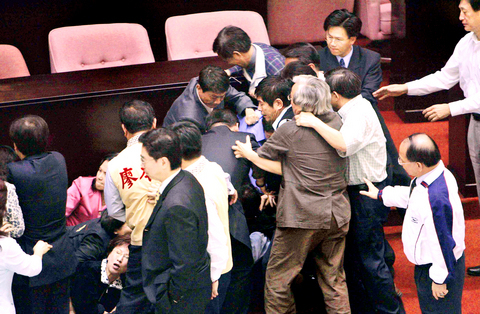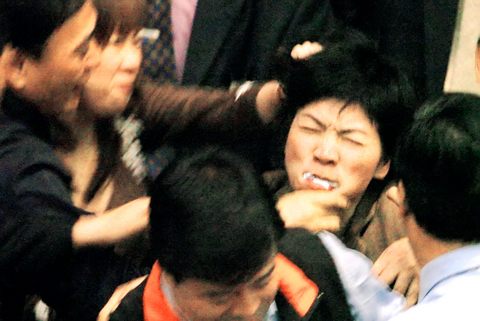Pandemonium broke out on the legislative floor yesterday as the pan-green camp for the third time blocked a proposal to establish direct transport links with China from being put to a vote -- with one legislator even snatching the proposal away and stuffing it in her mouth in protest.
On the last day of the legislative session, the Chinese Nationalist Party (KMT) and People First Party (PFP) proposed that their cross-strait direct links proposal be put to a vote.
Cross-party negotiations on the amendments to the Statute Governing the Relations Between the People of the Taiwan Area and the Mainland Area (

PHOTO: WALLY SANTANA, AP
The pan-blue camp's proposal would lift restrictions on cross-strait transport, effective three months after the amendments were passed.
The pan-green camp has opposed the measure on the grounds that it would undermine the government's authority to set cross-strait economic policy.
The pan-green camp had vowed that it would thwart the pan-blue's efforts, and it made good on that promise again yesterday.

PHOTO: CHIEN JUNG-FENG, TAIPEI TIMES
Snatched away
Just as PFP Legislator Ko Shu-ming (柯淑敏) was about to submit the revised clauses to be voted on one by one, DPP Legislator Wang Shu-hui (王淑慧) grabbed the proposal paper from Ko's hands and stuffed it in her mouth, in a sudden move that astonished other lawmakers.
Wang later spat out the document and tore it up after opposition lawmakers failed to get her to cough it up by pulling her hair.
During the melee, another DPP legislator, Chuang Ho-tzu (
"She spat saliva," yelled Hung Hsiu-chu (
Other pan-green and pan-blue lawmakers began to shove and shout at each other, forcing the legislative session to grind to a halt amid the chaotic free-for-all.
Legislative Speaker Wang Jin-pyng (
Back for more
There was a second round of chaos in the late afternoon, with lawmakers once again clashing with each other. Wang then announced a review of other provisional motions, while the pan-blue camp boycotted all motions proposed by the pan-green camp. The session then shuddered to a halt as Deputy Legislative Speaker Chung Jung-chi (
With the pan-blue camp's refusal to extend the legislative session, the legislature went into a recess until September.
Only 75 bills were passed during the past legislative session. Many major bills have been postponed, including the arms procurement bill, the special budgets for the Special Statute for Increasing Investment in Public Construction (
Those issues will not be taken up until the fall, unless a special session is held.
DPP caucus whip Ker Chien-ming (
But the PFP caucus said it would consent to holding an extraordinary secession. The KMT caucus said that it will discuss the matter in order to decide whether to accept the DPP's suggestion.
KMT Chairman Ma Ying-jeou (馬英九) later yesterday denounced the pan-green camp for blocking the establishment of direct transport links by taking over the podium in the legislature.
"We hope that the governing party will take measures to restrain its members from taking over the podium. Taiwan will lose face if they keep doing this," Ma said.
Ma called on the pan-green camp to sit down and discuss the issue rationally with opposition parties.
"Businesses and the general public all want the bill to pass the legislature, but the ruling party has blocked it with such a measure. History will judge this," he said.
Additional reporting by Mo Yan-chih

A car bomb killed a senior Russian general in southern Moscow yesterday morning, the latest high-profile army figure to be blown up in a blast that came just hours after Russian and Ukrainian delegates held separate talks in Miami on a plan to end the war. Kyiv has not commented on the incident, but Russian investigators said they were probing whether the blast was “linked” to “Ukrainian special forces.” The attack was similar to other assassinations of generals and pro-war figures that have either been claimed, or are widely believed to have been orchestrated, by Ukraine. Russian Lieutenant General Fanil Sarvarov, 56, head

SAFETY FIRST: Double the number of police were deployed at the Taipei Marathon, while other cities released plans to bolster public event safety Authorities across Taiwan have stepped up security measures ahead of Christmas and New Year events, following a knife and smoke bomb attack in Taipei on Friday that left four people dead and 11 injured. In a bid to prevent potential copycat incidents, police deployments have been expanded for large gatherings, transport hubs, and other crowded public spaces, according to official statements from police and city authorities. Taipei Mayor Chiang Wan-an (蔣萬安) said the city has “comprehensively raised security readiness” in crowded areas, increased police deployments with armed officers, and intensified patrols during weekends and nighttime hours. For large-scale events, security checkpoints and explosives

PUBLIC SAFETY: The premier said that security would be tightened in transport hubs, while President Lai commended the public for their bravery The government is to deploy more police, including rapid response units, in crowded public areas to ensure a swift response to any threats, President William Lai (賴清德) said yesterday after a knife attack killed three people and injured 11 in Taipei the previous day. Lai made the remarks following a briefing by the National Police Agency on the progress of the investigation, saying that the attack underscored the importance of cooperation in public security between the central and local governments. The attack unfolded in the early evening on Friday around Taipei Main Station’s M7 exit and later near the Taipei MRT’s Zhongshan

REBUFFED: In response to Chinese criticism over recent arms sales, Washington urged Beijing to engage in meaningful dialogue instead of threats and intimidation Washington’s long-term commitment to Taiwan would not change, the US Department of State said yesterday, urging Beijing to stop pressuring Taiwan and engage in meaningful bilateral dialogues. The remarks came in response to a backlash from Beijing about Washington’s latest approval of arms sales to Taiwan. The US Defense Security Cooperation Agency said in a statement on Wednesday that the Taipei Economic and Cultural Representative Office in the US has asked to purchase an arms package, including Tactical Mission Network Software; AH-1W helicopter spare and repair parts; M109A7 self-propelled howitzers; HIMARS long range precision strike systems; tube-launched, optically tracked, wire-guided missiles; Javelin